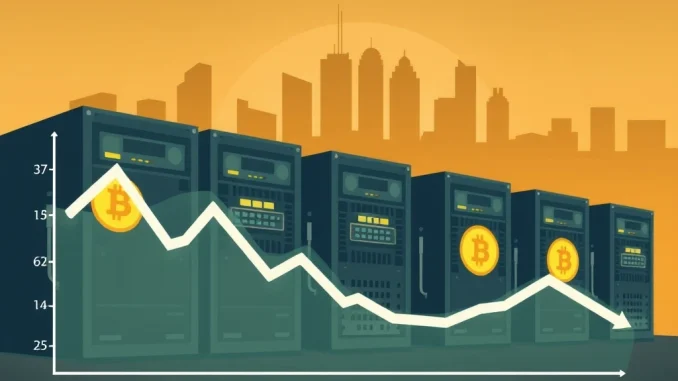
Hold onto your hats, crypto enthusiasts! The latest buzz from Wall Street isn’t exactly bullish for Bitcoin miners. A recent report by U.S. investment bank Jefferies has dropped a bombshell: Bitcoin mining profitability took a significant hit in March, declining by a hefty 7.4%. For anyone keeping a close eye on the pulse of the cryptocurrency market, this news raises some crucial questions. Let’s dive into what’s behind this dip and what it could mean for the future of Bitcoin and the broader crypto landscape.
Why Did Bitcoin Mining Profitability Suddenly Dip?
According to CoinDesk, citing Jefferies, the primary culprits behind this downturn in Bitcoin mining profitability are twofold. Firstly, the average price of BTC itself experienced an 11.2% decrease in March. Secondly, transaction fees, a vital revenue stream for miners, also saw a substantial 9.1% fall. When both the price of Bitcoin and the income from transaction validations decline, it creates a double whammy effect directly impacting miner earnings. Let’s break down these factors further:
- BTC Price Decline: An 11.2% drop in the average Bitcoin price directly translates to lower dollar-denominated rewards for miners for each block they successfully mine. This price volatility is inherent in the crypto market, but a double-digit percentage drop in a single month is certainly noteworthy.
- Fall in Transaction Fees: Bitcoin miners not only earn newly minted BTC for each block but also collect transaction fees from users who want their transactions included in blocks. A 9.1% decrease in these fees suggests either fewer transactions being processed or lower fees being paid per transaction, both of which squeeze miner revenue.
In essence, miners are caught in a squeeze play – receiving less per Bitcoin mined and earning less from the transactions they process. This naturally leads to a contraction in Bitcoin mining profitability.
Bitcoin Mining Profitability vs. Market Performance: A Paradox?
Here’s where things get interesting. Despite the gloomy news regarding Bitcoin mining profitability in March, the narrative takes a surprising turn in April. The report highlights that Bitcoin actually outperformed the S&P 500 in April. This might seem counterintuitive – if mining profitability is down, shouldn’t Bitcoin’s overall performance also suffer? Not necessarily.
The potential reason cited for Bitcoin’s outperformance is dollar weakness. When the U.S. dollar weakens, assets like Bitcoin, often seen as alternative stores of value, can become more attractive to investors. This inverse relationship between the dollar and Bitcoin is a dynamic worth keeping an eye on. It suggests that while mining economics might face headwinds, broader macroeconomic factors can still propel Bitcoin’s market performance.
What Does This Mean for the Crypto Market and Bitcoin Miners?
The dip in Bitcoin mining profitability serves as a stark reminder of the inherent volatility and complexities within the crypto market. For Bitcoin miners, who invest heavily in infrastructure and energy, fluctuations in profitability can significantly impact their operations and long-term viability. Here are some key takeaways:
- Increased Pressure on Mining Operations: Lower profitability can force less efficient or highly leveraged miners to scale back operations or even shut down. This could lead to consolidation within the mining industry.
- Importance of Cost Efficiency: In times of reduced profitability, miners with access to cheaper energy sources and more efficient mining hardware will have a distinct advantage. Cost management becomes paramount.
- Market Sensitivity: The report underscores how closely Bitcoin mining profitability is tied to both BTC price and network transaction activity. Miners must be prepared for these fluctuations and adapt their strategies accordingly.
- Broader Market Signals: While mining profitability is a sector-specific metric, it also provides insights into the overall health and sentiment of the crypto market. A sustained period of low profitability could signal broader challenges within the ecosystem.
Navigating the Bitcoin Mining Landscape: Challenges and Opportunities
The journey of a Bitcoin miner is not without its hurdles. Beyond price volatility and transaction fee fluctuations, miners face numerous challenges:
| Challenge | Description |
|---|---|
| Energy Costs | Bitcoin mining is energy-intensive. Fluctuating energy prices and the push for sustainable mining practices add complexity. |
| Hardware Obsolescence | Mining hardware rapidly becomes outdated. Miners need to constantly upgrade to maintain efficiency. |
| Regulatory Uncertainty | The regulatory landscape for crypto mining varies globally and is constantly evolving, creating uncertainty. |
| Network Difficulty Adjustments | Bitcoin’s mining difficulty adjusts automatically, impacting the rate at which blocks are mined and rewards are earned. |
However, amidst these challenges, opportunities exist. Technological advancements in mining hardware, innovative energy solutions (like renewable energy integration), and the potential for increased institutional adoption of Bitcoin could create new avenues for growth and profitability in the long run.
Conclusion: A Call for Vigilance in the Crypto Mining Space
The 7.4% drop in Bitcoin mining profitability in March, as highlighted by Jefferies, serves as a crucial reminder of the dynamic and sometimes unpredictable nature of the crypto market. While Bitcoin demonstrated resilience by outperforming the S&P 500 in April, the underlying pressures on mining economics warrant attention. For investors, miners, and crypto enthusiasts alike, staying informed, adapting to market shifts, and understanding the multifaceted factors influencing Bitcoin mining profitability are essential for navigating this exciting yet volatile landscape. The crypto journey is rarely a smooth ride, but by understanding these dips and surges, we can all be better prepared for what lies ahead in the fascinating world of digital assets.



